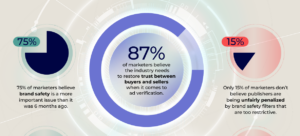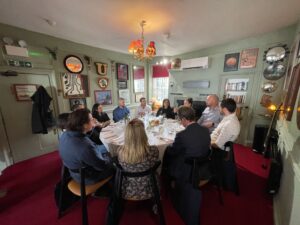NDA has always been dedicated to celebrating the digital industry and as the pandemic took hold we launched our Reasons to be Cheerful series. As we face an uncertain economic future, we’ll be hearing from leaders across our industry to discover what’s keeping them smiling as we enter 2023. Next up is Matt Andrew, UK GM and Partner at Ekimetrics…
What are you most excited about in the digital industry in 2023?
We’re on the precipice of marketers re-thinking marketing effectiveness. They are beginning to realise that attribution and measuring digital in isolation is fundamentally flawed. But many are still grappling with what to do about it. Some of the ‘new’ solutions are essentially reinventions of econometrics.
With econometrics at our core, we ensure it is fit for digital and implementation at scale. Using triangulated methods under a single framework ensures decisions from macro to micro-level are consistent, avoiding questions such as ‘which ROI do we mean?’. Attribution and identity have their place but need to be used wisely.
Our partners, such as Google and Meta, are clear that MMM solutions are the way forward and we work with them to help clients make confident decisions. That couldn’t be more crucial in a world of uncertainty.
What are you most positive about for your business in 2023?
Our UK team grew by 60% last year and we have over 400 data scientists worldwide. That means we have the critical mass to make significant impact, whether through access to expertise or tools. There’s little doubt that is what will be needed in 2023.
The ongoing development and expansion of our Data Science Transformation, Customer Centricity and MMM solutions is helping some major brands with holistic measurement globally at scale. In 2023, we’ll continue to deliver analytics platforms, with solid data architectures and self-serve facilities, as well as the deep dive high-value insight our consultants bring to the mix.
How will the digital industry, and your company, help make life better for consumers or partners in 2023?
Sustainability is high on our agenda. It’s a problem that every individual needs to own, at work and home. It can’t be the preserve of a specific team in a business or meaningful change won’t happen.
In a downturn, profitable trading is essential to survival; good intentions may be side-lined. But it doesn’t have to be profit or planet. It can be both. However, that requires significant understanding of where impact can be made – which means using data, not gut feel. There are many ‘big’ issues companies can tackle, but if we make everything that bit more efficient it can add up, for example, ensuring we deploy only digital marketing that is most likely to yield results reduces the environmental impact from servers – which in turn makes advertising more relevant and interesting for consumers.
We already have several qualified sustainability experts and by the end of the year, our whole business will be trained. We’re embedding sustainability metrics into our clients’ marketing dashboards and aiming for B Corp certification.
What technologies have you been most impressed with this past year, and which will have the most impact in 2023?
The Metaverse and web 3.0 are still in their infancy but the potential is special. While marketers need to be considered about how they approach their opportunities – the usual rules of understanding your audience and where they are still apply – for some, now is the time to think about how they invest. For others, they should bide their time. Find your focus and don’t get swept away by the hype.
And you can’t fail to be impressed by codeless platforms and advances such as ChatGPT. The future of AI is already here and the opportunity is extraordinary, considerably beyond asking it to write LinkedIn posts.
What, if any, positive impacts on the digital industry could an economic downturn have?
An economic downturn is inevitably grim, but as the old adage goes, necessity is the mother of invention.
Businesses will need to look for new audiences and that means they need a better understanding of their current customers, where they live, work and play and where they may be in new markets. Digital has a significant role to play in executing this, with the ability to reach new potential audiences, and test and learn quickly.
Plus digital brings flexibility and that is key to an agile marketing planning process, though it’s important to guard against flip-flopping that results in poorer performance. It’s essential to get those bigger budget and strategy decisions right before even thinking about the nuances of campaign management.
Digital creative optimisation, as outlined in our recent study with Meta, econometrics and MMM, true customer centricity and analytics used holistically – with an all-encompassing view of marketing and breaking down of silos – can unleash the true potential of digital as an integral part of marketing.











